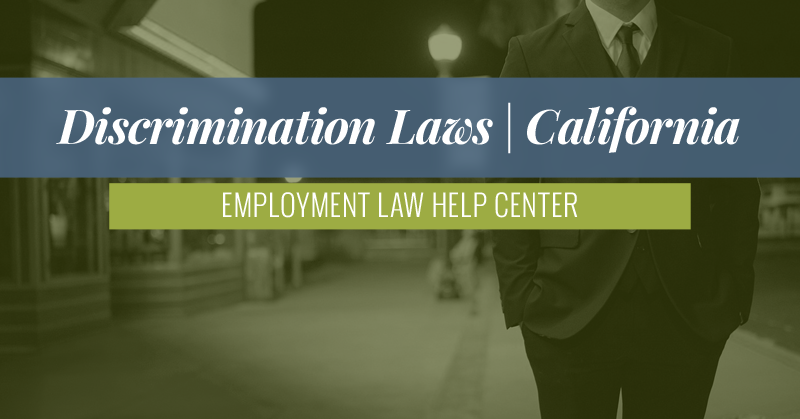California Workplace Discrimination
Both federal and California state laws prohibit employment discrimination on the basis of “protected characteristics,” which include, but are not limited to, race, national origin, physical disability, sex and marital status. To establish a case of workplace discrimination under California law, the employee in question must demonstrate that (1) he belongs to one of these protected classes, (2) he was qualified for the employment position, (3) he was subject to an adverse employment action, and (4) similarly situated individuals who were not members of a protect category were treated more favorably. If you believe you missed out on being hired or promoted, or if you were sexually harassed or retaliated against, because of your membership in a protected class, consult a knowledgeable California workplace discrimination lawyer today to discuss your options for legal recourse.

California Laws Prohibiting Discrimination
There are federal laws in place that prohibit discrimination in workplaces across the United States, including the Equal Pay Act of 1963, the Age Discrimination in Employment Act, Title VII of the Civil Rights Act of 1964, and the Americans with Disabilities Act, but state law in California is actually considered to be more favorable towards employees than federal law. California’s Fair Employment and Housing Act, for example, dictates that coworkers who are not supervisors can be sued and held personally responsible for unlawful harassment in the workplace, which is contrary to federal law. Also, while federal law typically requires an employee to file a discrimination claim with the Equal Employment Opportunity Commission (EEOC) within 180 days of the discriminatory violation, state law in California gives victims of workplace discrimination a full year to file a claim with the California Department of Fair Employment and Housing (DFEH). Under California’s broad pro-employee laws, which are considered to be some of the best in the United States, protected characteristics include:
- Race
- Color
- National origin
- Religious creed
- Ancestry
- Mental disability
- Physical disability
- Marital status
- Medical condition
- Age
- Sex
- Sexual orientation
- Gender identity
- Genetic information
- Military and veteran status
Types of Workplace Discrimination in California
Employment discrimination occurs when an employer unlawfully treats members of a protected class differently than other individuals, by refusing to hire them, failing to promote them, sexually harassing them, discharging them from employment, unfairly denying them certain privileges, or paying them less. Like most states, California is an at-will employment state, which means employers can terminate an employee at any time and for any reason, or for no reason at all. That is, of course, unless the termination is based on a protected characteristic, in which case the employee may have grounds to file a claim for wrongful termination. There are many different forms California workplace discrimination can take, including the following:
- Disparate treatment discrimination – Actions on the part of an employer that single out an employee because of a protected characteristic (i.e., only male workers are promoted, or only older workers are laid off).
- Disparate impact discrimination – Employer policies that have a disproportionate adverse impact on a protected class (i.e. a company policy that counts all absences and leaves against seniority, which has a disproportionate adverse impact on women, who may have to take time off for pregnancy).
- Harassment – Employer or co-worker’s offensive conduct on the basis of a protected characteristic, such as unwanted advances or sexual slurs towards women.
- Hostile work environment harassment – Sexual harassment that is so severe or pervasive that is creates a work environment that is considered abusive or hostile.
- Quid pro quo harassment – A form of sexual harassment in which an employee’s supervisor implies that submitting to sexual favors or unwanted sexual advancements is a condition of the worker’s employment or another job benefit, such as a promotion.
Contact a Reputable California Discrimination Lawyer
Workplace discrimination laws in California offer powerful and effective protections for employees who believe they are being treated unfairly or unlawfully at work on the basis of a protected characteristic, such as age, sex, race or religion. However, discrimination laws are changing constantly, and it can be difficult to navigate the process of filing a discrimination claim on your own, especially if you don’t have a legal background or experience dealing with the California Department of Fair Employment and Housing. Contact an experienced employment law attorney today, if you believe you or a loved one has been the victim of workplace discrimination in California.





